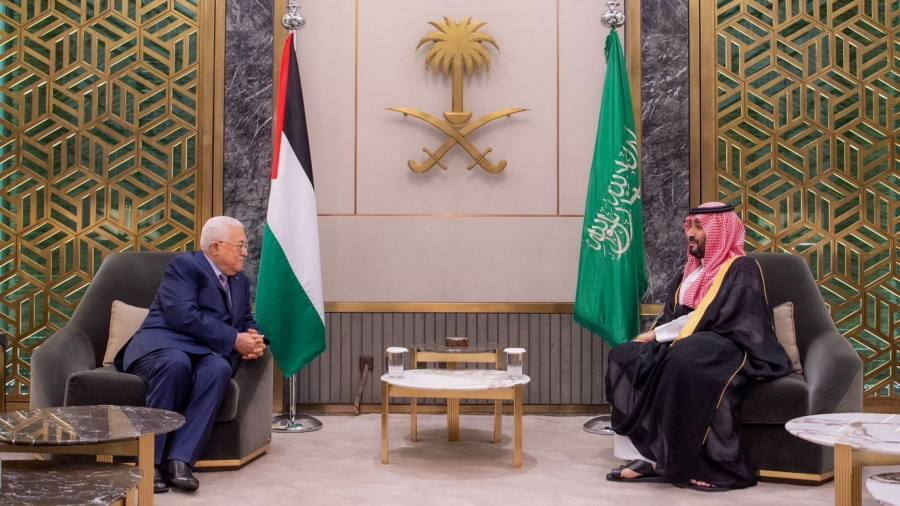
Receive free Middle Eastern politics & society updates
We’ll send you a myFT Daily Digest email rounding up the latest Middle Eastern politics & society news every morning.
Senior US and Palestinian officials have travelled to Riyadh for talks on a complex deal to establish diplomatic ties between Saudi Arabia and Israel in return for Israeli concessions to the Palestinians and American security guarantees for the kingdom.
The talks have gained momentum since June but remain fraught with difficulties. These include doubt over whether Israel’s far-right government would make significant concessions to the Palestinians, and Saudi demands from the US to secure a defence alliance and for it to be allowed to enrich uranium for a nuclear power plant.
Saudi Arabia refused to join several other Arab states, including neighbouring United Arab Emirates, when they normalised relations with Israel in 2020. Saudi officials had said they would demand bigger concessions, both from the US and Israel, in return for a deal that could reshape Israeli relations with Arab and Muslim countries, given the kingdom’s status among Muslims.
The negotiations in Saudi Arabia this week come ahead of a possible meeting between US president Joe Biden and Saudi crown prince Mohammed bin Salman, the kingdom’s day-to-day ruler, on the sidelines of this weekend’s G20 summit in India.
Jake Sullivan, US national security adviser, told reporters on Tuesday that the delegation, led by Middle East adviser Brett McGurk and assistant secretary of state Barbara Leaf, would discuss other regional issues with the Saudis, such as a truce in Yemen. He also confirmed they would hold talks with the Palestinians, who came to Riyadh to discuss their position with Saudi Arabia ahead of any deal with Israel.
One Palestinian official said they wanted US support for full UN membership, where they currently have observer status, among other things.
US news site Axios has reported that the Palestinians are also seeking administrative control of territories held by Israel in the West Bank, which it has occupied since 1967, and a freeze to Israeli settlements there.
They already control parts of the West Bank under a 1995 agreement with Israel that divided the territory into areas administered by the Palestinians, areas jointly administered by the Palestinians and Israel, and areas that are completely controlled by Israel.
“The goal of the [talks] is to explain the Palestinian position in general. People link it to a normalisation [of Israel-Saudi relations] but in my opinion I don’t think it’s imminent,” said another Palestinian official.
People familiar with the Saudi position said that the kingdom needed concessions for the Palestinians to move ahead with a deal.
In 2002, Saudi Arabia engineered an Arab peace initiative offering Israel recognition in return for a Palestinian state. But its ties with the Palestinian leadership have been strained since, and it started to cut off funding to the Palestinian Authority in 2016.
In recent weeks, however, Saudi Arabia has a made a show of including the Palestinians in the talks amid concerns that a deal could be struck without their involvement or consent. Riyadh also appointed its first ambassador to the Palestinian leadership.
“We’re back on track, there’s a line of communication between us and the Saudis at a very high level, which is significant,” said the Palestinian official. “We have full trust in Saudi Arabia.”
People familiar with the Saudi position said the Palestinian leadership should temper its demands if it expected any concessions from Israel, which is ruled by a coalition that includes far-right parties that are hostile to the idea of making any concessions to the Palestinians. An Israeli official previously told the Financial Times that territorial concessions or settlement freezes were unlikely.
Strains between the US and Saudi Arabia add another layer of difficulty in striking a deal. Relations between the two countries were at a low point last year after the kingdom ignored US requests to increase oil production, although they have since patched their differences.
But Saudi Arabia still faces considerable opposition in the US Congress, which would have to ratify any defence pact with the kingdom.
Additional reporting by James Politi in Washington